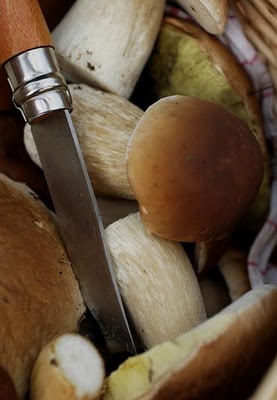
As Greg Marley, Maine forager and author of Mushrooms for Health: Medical Secrets of Northeastern Fungi can tell you, mushroom poisoning should not be taken lightly. Many experienced foragers have found out the hard way that mushrooms found in the wild can harbor dangerous secrets that lead to illness, even death.
But those funny little growths popping up around the yard and along woodsy trails creating a showcase of colors, shapes, and tastes could be trying to tell you something, Alice. Commercial mushrooms hide some healthy secrets, too, and even if you aren’t an experienced forager, you can still put the many benefits of mushrooms into your diet.
The Mushroom’s Major Health Benefits
Virtually all edible mushrooms are low in calories and high in proteins and vitamins, and the most common varieties can be easy on the budget. But beyond just a healthy low-cal food, mushrooms are lauded as having medicinal superpowers. They are used in alternative medicine and traditional Chinese medicine and are credited with promoting adaptive abilities in the body— they fight illness, restore balance, and provide resistance to disease. Some mushrooms are considered “probiotic” and are said to provide a powerful boost to the immune system.
While North America rarely recognizes these medicinal benefits (with the exception of herbalists and some researchers) studies have supported their positive effects on fighting some cancers. Many consider mushrooms an untapped resource, one of Asia’s several underutilized but recently discovered foods such as green tea and soy.
 | ||
| Foraging for Fun (Not for Eating): Mushroom varieties from the author’s back yard. |
Even the button mushroom – the small, white staple of produce aisles, salad bars, and pizzas – is a representative of this healthy, inexpensive food that you can eat a lot of. They are low in calories and have a light, earthy taste that is universally enjoyable (despite a lack of respect in culinary circles).
Also, mushrooms provide an excellent opportunity to cut back on meat, if that’s one of your dietary goals. Many mushrooms can have meat-like texture that can satisfy a need for protein. Portobellas, for example, taste very similar to meat and can act as an excellent substitute for a number of meat-centered recipes (such as burgers, below).
Some Kind of Mushroom
Many mushroom varieties are revered for their health benefits. Here are a few worth knowing about:
The chaga, which looks like a lumpy hunk of burned wood, is often made into a tea as a way to provide a plethora of immune boosting and anti-inflammatory benefits.
Shiitakes are known as a delicacy, and they are used in soups and vegetarian dishes; they can also be found dried. Their rich lentinan content makes them popular for their effect on preventing some cancers, and they are also an important source of antioxidants.
Portobellas grow longer and larger, and are known for their wide circular cap. They are full of vitamins and minerals, including a variety of B complex vitamins.
 Buttons are perhaps the easiest and cheapest mushroom to obtain, and while they may be ordinary, new research indicates they can help lower cholesterol and prevent chronic diseases, and they may have all the antioxidant properties of the more expensive varieties.
Buttons are perhaps the easiest and cheapest mushroom to obtain, and while they may be ordinary, new research indicates they can help lower cholesterol and prevent chronic diseases, and they may have all the antioxidant properties of the more expensive varieties.
The reishi is a red mushroom that is credited, along with maitake and shiitake, as being a true medicinal mushroom. Research indicates they boost heart health, lower the risk of cancer, and promote immune function, among other benefits. They are grown in China and parts of Asia, and they aren’t readily available in the states, though many companies offer supplements claiming to offer similar healing benefits.
Portobello – Welcome to Your New Favorite Burger
Portobello mushrooms, with their meaty texture and perfect burger-patty roundness, offer a perfect substitute for the hamburger. They are low in calories, low in fat (about 30 calories, compared to a 3-ounce burger patty, which has abut 235 calories), and high in fiber, and they deliver big doses of potassium, vitamin B and selenium for optimal antioxidant activity.
Look for smooth, firm caps when shopping for the portobello, and avoid any soft and slimy areas – the rule of thumb for shopping for any mushroom. Store them in the fridge in a loosely closed paper bag, or wrapped inside a dampened cloth.
Start with these Portobello Burger recipes:
Mediterranean Portobello Burger from FoodNetwork.
Grilled Portobello Mushroom Burger from Recipetips.
Eating Well’s take on the Mediterranean Portobello Burger.
Get a fervor for fungi! Find more information about the heath benefits of mushrooms at Fungus Among Us, and discover mushroom clubs, journals and newsletters.